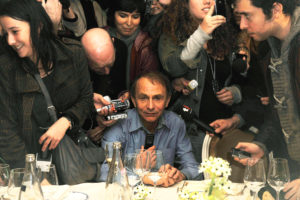According to elite cultural consensus, the great villain in America is the white male, so it’s only logical that publishing would run the toxic literary bad boys off. But this hatred is only levelled at the American man. Other talents have had better luck.
Take Roberto Bolaño. When he first appeared on the American scene in 2003 with the English translation of By Night in Chile, he was hailed by Susan Sontag as a major voice of Latin American literature. But it wasn’t until the posthumous publication of The Savage Detectives in 2007 that he became a household name among the smart set. That novel, a towering work of literary virtuosity, would go on to be a national bestseller. Bolaño, who’d died in 2004 at the age of 50 from complications due to a liver condition, became that rarest of breeds — the writer who goes by a single name.
In 2008, his short stories began to appear in The New Yorker, and the same year saw the English translation of Bolaño’s masterpiece, the 900-page 2666, completing the cycle of his major works. But the publishing world was hungry for new Bolaño, whether he was around to write it or not. More than fifteen books have been published since 2666, the most recent in February 2021. Just when you think the last novella or half-finished short story collection has been unearthed from his hard drive, another one is announced. Like Charles Bukowski, Bolaño has found a fame in death he would’ve scoffed at during his life, which he spent as a struggling poet in Chile, Mexico and Spain.
Bolaño is worthy of his place in the canon, but he would’ve had a harder time earning it had he been an American. For the US literary establishment, Bolaño’s foreignness was central to his appeal. At a time when the literary Jonathans — Franzen and Safran Foer — and what remained of the old white males reigned supreme, here was a dead Chilean poet whose seedy, often macho stories of Latin American depravity offered white liberal readers a chance to wallow in grit and grime.
Wokeness wasn’t yet a factor then, but the winds were blowing in that direction. Bolaño offered an outlet for New Yorker readers who wanted some of the “toxic masculinity” — sex, violence, and machismo — that they’d previously gotten from the likes of Roth and Mailer. Bolaño, a foreign noble savage, was the perfect guy for the role.
Bolaño’s stature has only grown over the past 20 years, even as the literary world became increasingly feminised; both readers and editors are now mostly women. It’s a trend that’s been picked up on, and even lamented, by the Times, the TLS, and the Observer. It’s almost impossible to find debut novels by American men, and especially white men, about the plight of heterosexual males.
With foreign writers, it’s a different story. Like Bolaño, the French novelist Michel Houellebecq and his Norwegian contemporary Karl Ove Knausgård, have epitomised the rise of the literary noble savage. These two have built careers on “problematic” subject matter that would get an American-born writer cancelled. Why are imports allowed to thrive?
A European like Knausgård, perhaps the whitest man in existence, can still be embraced by the publishing industry. His autobiographical My Struggle novels, which chronicle his everyday life in tedious and often brilliant detail, are almost pathologically self-indulgent. They are also, to put it lightly, controversial. The narrator, a Knausgård stand-in named Karl Ove Knausgård, rants against political correctness and feminist parenting, describes his attraction to his students while teaching at a high school, relates his anger at being falsely accused of rape, and, in general, details his sexual proclivities and hang-ups in all their quotidian repulsiveness.
But one gets the sense that the books are popular among elites not in spite, but because of the way they muck around in male sexuality. Take one look at the grizzled and handsome Knausgård and it’s obvious that there is a psychosexual element at play here. Wokeness requires a degree of repression, which in turn necessitates an outlet for release. The sexual itch must be scratched in a non-problematic manner, and since the noble savages are foreign curiosities who can’t be expected to internalise the progressive ways of America, they get a free pass. The elite reader can be titillated by Knausgård’s grubby masculinity while keeping his or her conscience clean.
The American male novelist, by contrast, is despised not for his toxic masculinity but because he ought to know better. Unlike the noble savage, the American male is expected to understand what is and isn’t problematic — he went to college, after all. For him, masculinity is something to be condemned and renounced. The embodiment of this emasculated ideal is Ben Lerner, a master of self-flagellation whose 2019 novel The Topeka School “decodes white male rage”. Pull up any picture of Lerner and he looks just about ready to weep.
American men who deviate from the Lerner school are treated like Callan Wink, whose debut, August, a coming-of-age novel set in Montana and Michigan was panned in the New York Times in no small part due to its flirtations with masculine bravado. “Despite his abundance of literary talent,” the reviewer teases, “we’ll be sure not to mistake [Wink] for some effete literary type.” The reviewer’s problem, of course, is that Wink, who lives in Montana and writes about Western men, is far too close to the American savages of old. Wink graduated from an MFA program and has published stories in The New Yorker. That means he got the memo, which makes his defiance unforgivable.
The case of Pulitzer Prize-winner Junot Diaz is another cautionary tale: this time about what happens to writers who make the leap from noble savage to upstanding member of the American literati. Diaz, who was born in the Dominican Republic, became a celebrity in 1996 with the publication of Drown, a short story collection documenting the gritty island life of his homeland. But as his fame grew, and especially after he won the Pulitzer for The Brief and Wondrous Life of Oscar Wao, something funny happened: he was civilised. He landed a teaching gig at MIT, and even if he still spat out his patented Dominican slang at readings, it was clear that he’d been domesticated. Diaz was an American writer.
But with Americanisation comes cancellation. In 2018, Diaz became the subject of a #MeToo campaign, led by former students and writers whom he had mentored. He was accused of overstepping boundaries, pushing himself on female writers and getting handsy. Blinded by the awards and the fawning press, Diaz failed to realise that the sort of behaviour that was indulged in a Dominican was off-limits for a Yank.
Bolaño is still pumping out books nearly two decades after his death, but many a noble savage has joined him in recent years, including his countryman Alejandro Zambra and the Argentinian César Aira. And they just keep coming. The latest in the genre, The Women I Love, by the Italian Francesco Pacifico, came out in December, and is described by the publisher as “a provocative and bracing send-up of modern masculinity”. That’s publicity speak for: a noble savage Italian dude fucks around for 300 pages, magnificently unafraid of committing a microaggression.
For American novelists, the news is bleak but not hopeless. You may need to neuter your writing. You may need to show exquisite sensitivity to the ever-shifting rules around race and gender. You may need to conduct your personal life with the utmost progressive decorum. But if you change your name and flee the country, you can write whatever you want.
Disclaimer
Some of the posts we share are controversial and we do not necessarily agree with them in the whole extend. Sometimes we agree with the content or part of it but we do not agree with the narration or language. Nevertheless we find them somehow interesting, valuable and/or informative or we share them, because we strongly believe in freedom of speech, free press and journalism. We strongly encourage you to have a critical approach to all the content, do your own research and analysis to build your own opinion.
We would be glad to have your feedback.
Source: UnHerd Read the original article here: https://unherd.com




